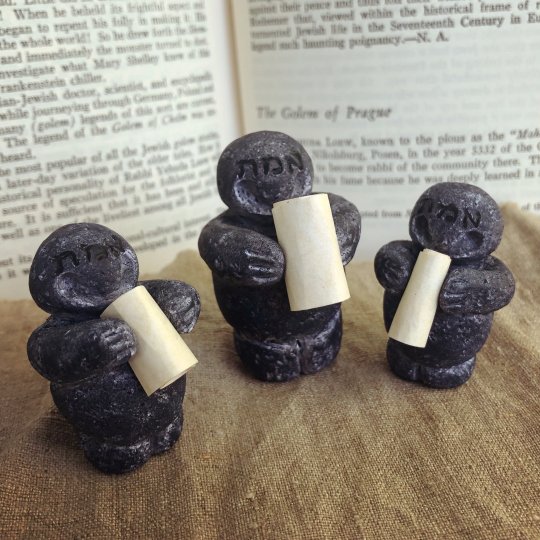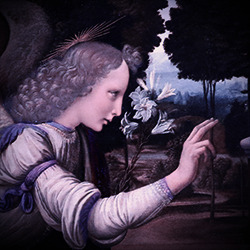#jewish scripture & legend
Text
Pod-Together Day 1 Reveals 2023
The Matchmaking Bentley (Good Omens (TV), Good Omens - Neil Gaiman & Terry Pratchett, Queen (Band))
written by ChrisCalledMeSweetie, performed by Juulna
Summary: Crowley's Bentley is determined to make the ineffable husbands' relationship more effable - with a bit of help from Queen.
Just Missed You (Ted Lasso (TV))
written by chainofclovers and gnen, performed by klb, rockinhamburger, petrodobreva, eafay70, Ceewelsh, JanuariumPods, meyml, ToughPaperRound, dairaliz, SSLeif, HowOldAreWe, gnen, chainofclovers, and DryDreams
Summary: Ted and Beard, one year later.
(They love each other, they will see each other again.)
A "found audio" story for pod-together 2023.
Value (Jewish Scripture & Legend)
written by Hagar, performed by eafay70
Summary: Le’a is kind as often as possible, but it doesn’t always help ease the sting of life in the shadow of her beautiful sister Rachel.
Lightning (Sherlock Holmes & Related Fandoms, Sherlock Holmes - Arthur Conan Doyle, Sherlock Holmes (1984 TV))
written by tadhana_writes, performed by gracicah
Summary:"Lightning flashed.
In that horrible moment of pure light, I saw my mistake."
Things are well. Holmes has returned, life has returned to a quiet lull, and they're in another case. Same thing as always.
By the light of a thunderstorm, Watson realises that things may not be the as well as he wishes them to be.
Pay Attention to Me (A3! (Video Game), A3! (Anime))
written by Dokuhan, performed by ChaosKiro
Summary: Chikage will swear up and down, left to right, backwards and forwards that jealousy is beneath him. But that becomes a lot harder to say when Sakuya and Tasuku start spending more time together than usual.
camouflage (Twisted-Wonderland (Video Game))
written by roxas_oxo13, performed by Wonderlandian_Geek
Summary: “You remind me of myself, I guess.”
“Impossible.”
“Why’s that?”
It's now or never. He’s already not likable; he has to nothing to lose. “You’re good-looking. You’re always surrounded by your flowery little posse. You always have something to say. You don’t know what it’s like to have people avoid you and tell you that your parents are the only thing you have going for you. It’s always do this, try this, be better, until it’s time to do a science project and suddenly you’re hot shit.”
Visit to a Strange World (陈情令 | The Untamed (TV), 陈情令 | The Untamed (TV) RPF, 魔道祖师 - 墨香铜臭 | Módào Zǔshī - Mòxiāng Tóngxiù)
written by FlutterFyre, performed by pezzax
Summary: Xiao Zhan awakens to find himself in an impossible situation. He has more questions than he knows what to do with, the biggest being, How do I get home?
Surrender (Harry Potter - J. K. Rowling)
written by SanctuaryAngel, performed by SerenaEW
Summary: Harry ends his life within the Veil after losing Sirius, and Severus spends every day visiting, wondering if he should follow.
Don the Mantle [text, audio] (Star Wars: Rebels)
written by wanderingjedihistorian, performed by Flowerparrish
Summary: The world spun as he took in the date before him. Perhaps this was a nightmare of some sort? Or a hallucination? The brief said they weren’t entirely sure what protections the device had on it. Forcing him to relive the assault on Lasan certainly would be a fitting way to neutralize him. Still, that didn’t…that idea didn’t seem right. This felt all too real.
Not Alone (เขา...ไม่ใช่ผม | Not Me (TV 2021))
written by FlutterFyre, performed by Wereflamingo
Summary: Not that any of that mattered. Black wasn’t here and – like the rest of them – Sean was hooded, cuffed, and crammed in the back of this van like unwanted luggage.
Helpless.
Get A Read On Me (Men's Hockey RPF)
written by savvygambols, performed by Beryllinthranox
Summary: Roope considers Jason, his broad chest and his strong arms, his big dark eyes and his beautiful brown skin. Jason is a good-looking man and his shirt doesn’t fit at all.
“We’re going shopping after practice,” say Roope.
“Uh—” says Jason. He rubs his palms on his jeans. His jeans don’t fit. Roope can fix this. Roope can fix all of this. “I mean, I don’t know, Roope. I don’t, like—I mean, you know me and clothes, right? It’s not my thing.”
“It wasn’t a question,” says Roope. “We’re going.”
#podfic#fanfic#good omens#ted lasso#jewish scripture & legend#sherlock holmes#a3!#twisted wonderland#the untamed#harry potter#star wars rebels#not me the series#mens hockey rpf
44 notes
·
View notes
Text
Judaism, Angels, and Monstrosity
@neapolitangirl asked:
I'm writing a story about the angel Muriel traveling through a world inspired by American folklore (Ex. The Bell Witch, Fearsome Critters, etc) while hunting demons. I wanted to draw inspiration from the legend that says Muriel and Abaddon are one and the same because I thought it was interesting. However, I also know that Abaddon is important to Jewish cosmology and wanted to avoid any unfortunate implications.
Muriel is very skittish and kind of a coward, but turns into the more violent and vengeful Abaddon in the presence of demons. Appearance-wise both Muriel and Abaddon are tall and skinny, but Muriel is more like an owly-human while Abaddon is a spiky skeletal being. Would this be connecting Judaism to monstrosity? Also, is there anything else I should try to avoid?
So…angelology, the whole idea of angels with names and personalities and individual jobs, is just…not something the average Jewish person thinks or cares about, even the ones who know a little about it. Not that it’s bad, it’s just not something that is prominent enough that it would have tropes attached that we might be able to warn you against.
That said, we’re posting on the Niche Scholarship and Special Interest website, so if there’s a reader who happens to have a lot of knowledge and feelings about Jewish angelology we would welcome the contribution and specialized expertise.
As it stands, my instinct is to give these more general considerations:
Balancing Jewish and Christian Elements
To what degree are you trying to tell a Jewish story, a Christian story that does not harm Jewish readers, or a story strongly influenced by Christian ideas about the heavens in a way that does not harm Jewish readers? How does deciding where you fall among those distinctions affect how you construct your story, and how you portray your angels?
Jewish Concept of God and Angelic Appearances
To Jews, God Godself does not have a physical body or visible appearance. If you’re describing the appearance of God as you’re navigating your angel-centering narrative, you’re squarely outside the territory of inclusivity toward Jewish readers. That’s okay, if you’re clear with readers that you’re not telling a Jewish story. It’s not okay if you’re trying to conflate Jewish and Christian ideas into a single narrative when they are often incompatible.
Angelic Appearances and Jewish Scripture
Angels might have appearances, and some descriptions of some types of angels in some Jewish scriptures have body parts of various animals. I haven’t the foggiest clue if it matters to anyone what appearances belong to which angels, so if it matters to someone reading this I hope they will speak up.
Are angels Jewish? This is a subject that could make for a fun discussion among Jewish people as a way of exploring the nature of Jewishness, but in your narrative you will have to think this through in your own way. If your angels engage in Jewish practices, then what does that look like and why, and if they don’t, why don’t they? The answer to that may of course be “Because I’m not actually telling a Jewish story.”
Christian Themes and Sensitivity to Jewish Culture
It’s okay to not be telling a Jewish story. But in that case keep in mind what demonstrations of Jewishness you include in a Christian story.
Especially, if you’re depicting a divine Jesus, or a Jesus character with any type of more-than-human powers or ancestry, or you are including any reference to the idea that Christianity might be in any way objectively correct, then you must tread EXTREMELY CAREFULLY with including any depiction of Jewish practice in your work, as the line where depiction turns to appropriation is in that case extremely near.
In all things, try and avoid depicting Jewish humans and any character who might be Jewish or be seen as Jewish in ways that are otherwise harmful: we’ve often talked about tropes around greed, sneakiness, power-grabbing, gender and sexual dynamics, and other tropes that apply to portrayals of Jewish characters. If your angels are Jewish, or Jew-ish in flavor, that goes for them as well.
Again, I know absolutely zero about Muriel and Abbadon and am not very interested in learning more as their lore has zero bearing on my Jewish practice in any way, and that’s a somewhat important point to me to be making because…2J3O. Two Jews, three opinions. So again, if a reader does in fact have knowledge and opinions about the specific angels themselves, please speak up.
–Meir
567 notes
·
View notes
Text
Paradise Lost: How John Milton's 1667 work influenced "Hazbin Hotel"
I've been thinking about why the "fruit of knowledge" in Hazbin Hotel is depicted as an apple, as opposed to another fruit that would've been more accurate to the Middle East during the Fall of Man, as well as how Paradise Lost by John Milton (1667) influenced the show.

Per one source:
"Because the Hebrew Bible describes the forbidden fruit only as 'peri', the term for general fruit, no one knows [what exactly type of fruit it was]. It could be a fruit that doesn't exist anymore. Historians have speculated it may have been any one of these fruits: pomegranate, mango, fig, grapes, etrog or citron, carob, pear, quince, or mushroom."
Per Wikipedia:
"The pseudepigraphic Book of Enoch describes the tree of knowledge: 'It was like a species of the Tamarind tree, bearing fruit which resembled grapes extremely fine; and its fragrance extended to a considerable distance. I exclaimed, How beautiful is this tree, and how delightful is its appearance!' (1 Enoch 31:4)."
In Jewish and Islamic traditions, the "fruit of knowledge" is commonly identified with grapes. The Zohar explains that Noah attempted (but failed) to rectify the sin of Adam by using grape wine for holy purposes. Today, the "Noah grape" is still used to make white wine.

Furthermore:
"The association of the pomegranate with knowledge of the underworld as provided in the Ancient Greek legend of Hades and Persephone may also have given rise to an association with knowledge of the 'otherworld', tying-in with knowledge that is forbidden to mortals. It is also believed Hades offered Persephone a pomegranate to force her to stay with him in the underworld for 6 months of the year. Hades is the Greek god of the underworld, and the Bible states that whoever eats the forbidden fruit shall die."

So, how then did the apple become the foremost symbol of the "fruit of knowledge"? You can partly thank Paradise Lost by English poet John Milton, a work which the lore of Hazbin Hotel is based off of.
Milton published the book in 1667, a time when the hedonistic Restoration era was in full swing. The exiled King Charles II was restored to the throne as King of England in 1660, and was a party animal, with dozens of mistresses, and nicknamed both the "playboy prince" and "Old Rowley", the latter after his favorite lustful stallion.
However, the association of the "fruit of knowledge" began with a Latin pun long before Milton immortalized the association in Paradise Lost. Per the linked article above by Nina Martyris for NPR:
"In order to explain, we have to go all the way back to the fourth century A.D., when Pope Damasus ordered his leading scholar of scripture, Jerome, to translate the Hebrew Bible into Latin. Jerome's path-breaking, 15-year project, which resulted in the canonical 'Vulgate', used the Latin spoken by the common man. As it turned out, the Latin words for evil and apple are the same: 'malus'.
[...] When Jerome was translating the 'Tree of the Knowledge of Good and Evil', the word 'malus' snaked in. A brilliant but controversial theologian, Jerome was known for his hot temper, but he obviously also had a rather cool sense of humor.
'Jerome had several options,' says Robert Appelbaum, a professor of English literature at Sweden's Uppsala University. 'But he hit upon the idea of translating 'peri' as 'malus', which in Latin has two very different meanings. As an adjective, 'malus' means 'bad' or 'evil'. As a noun it seems to mean an apple, in our own sense of the word, coming from the very common tree now known officially as the 'Malus pumila'. So Jerome came up with a very good pun.'
The story doesn't end there. 'To complicate things even more,' says Appelbaum, 'the word 'malus' in Jerome's time, and for a long time after, could refer to any fleshy seed-bearing fruit. A pear was a kind of 'malus'. So was the fig, the peach, and so forth.'
Which explains why Michelangelo's Sistine Chapel fresco features a serpent coiled around a fig tree. But the apple began to dominate Fall artworks in Europe after the German artist Albrecht Dürer's famous 1504 engraving depicted the First Couple counterpoised beside an apple tree. It became a template for future artists such as Lucas Cranach the Elder, whose luminous Adam and Eve painting is hung with apples that glow like rubies.
Milton, then, was only following cultural tradition. But he was a renowned Cambridge intellectual fluent in Latin, Greek and Hebrew, who served as secretary for foreign tongues to Oliver Cromwell during the Commonwealth. If anyone was aware of the 'malus' pun, it would be him, and yet he chose to run it with it. Why?
Appelbaum says that Milton's use of the term 'apple' was ambiguous. 'Even in Milton's time the word had two meanings: either what was our common apple, or, again, any fleshy seed-bearing fruit. Milton probably had in mind an ambiguously named object with a variety of connotations as well as denotations, most but not all of them associating the idea of the apple with a kind of innocence, though also with a kind of intoxication, since hard apple cider was a common English drink.'
It was only later readers of Milton, says Appelbaum, who thought of 'apple' as 'apple', and not any seed-bearing fruit. For them, the forbidden fruit became synonymous with the 'malus pumila'. As a widely read canonical work, 'Paradise Lost' was influential in cementing the role of apple in the Fall of Man story."
To tie this back into John Milton's relationship with King Charles II of England, as mentioned, Milton originally served Oliver Cromwell, Lord Protector of England, and the English Commonwealth, which was formed with the overthrow and execution of King Charles I on 30 January 1649, following the bloody English Civil War (1642 – 1651).
The King's two sons - the newly-christened King Charles II, the elder, and James, Duke of York (King James II), the younger - fled into exile on the European continent. However, with the death of Oliver Cromwell on 3 September 1658 came the 2-year-long dissolution of the English Commonwealth, and the restoration of the monarchy.
As for Milton himself, we can look to an article by Bill Potter.
Milton, born on 9 December 1608, was around 51-52 years old when King Charles II was restored to the throne. He attended Christ's Church, Cambridge in his youth, and mastered at least six languages, as well as history and philosophy; making him, perhaps, the most knowledgeable poet in history. He spent more than a year travelling across Europe, conversing with and learning from intellectuals, linguists, poets, and artists, including the famous Galileo Galilei.
However, Milton was a controversial figure of his time, being unafraid to criticize institutions of authority; arguing that "divorce was Biblical", for which he was routinely condemned; joining the Puritans; penning the Areopagitica, a treatise on liberty in favor of Parliament and the Roundhead rebels, during the reign of King Charles I, arguing that the King must be held accountable by the people; and agreed with and justified the murder of King Charles I, for which Parliament hired him in 1649 as a propagandist and correspondence secretary to foreign powers, on account of his fiery manifestos against "the man".
The collapse of the Commonwealth with the death of Oliver Cromwell in 1658 did not deter Milton from continued political writing against the monarchy and the new public sentiment that brought about its Restoration under King Charles II in 1660. On the contrary, Milton - now totally blind, having lost his eyesight by the age of 44 in 1652, a decade earlier - began writing Paradise Lost in 1661, and spent the next six years dictating the work to transcribers.
A supporter of regicide, Milton was also forced into exile himself, and faked his own death, as Charles refused to pardon - and sought to execute - any of those directly involved with his father's murder. Milton's friends held a mock funeral for Milton on 27 August 1660, just months after the coronation of King Charles II on 23 April 1660.
King Charles II commented that he "applauded his [Milton's] policy in escaping the punishment of death [execution for treason] by a reasonable show of dying", but insisted on a public spectacle nonetheless by having Milton's writings burned by the public hangman.
After eventually obtaining a general pardon from King Charles II, Milton was imprisoned, and released, likely due to political friends in high places. He died, aged 64, in 1674. His theological views were sometimes considered heterodox by the best Puritans, and his political views came close to getting him executed on several occasions. His poetry, however, has endured as some of the greatest works in the English language, especially Paradise Lost; much of his greatest work was written during his 22 years of complete blindness.
One of the main factors in King Charles II deciding to grant a pardon to Milton was, ironically, Paradise Lost. While originally written by Milton as a scathing criticism of King Charles II and the monarchy - depicting Lucifer Morningstar as a sympathetic rebel against God, with King Charles II claiming that is right to rule came from "divine ordainment" - Charles II enjoyed the work, and authorized its publication on 20 August 1667. We know this because a 1668 copy of Paradise Lost in royal bindings by Samuel Mearne, bound lovingly in a fine red leather made of goat skins tanned with sumac, and stamped in gold with the royal cypher of King Charles II, was found. The endpapers bore a watermark with the royal arms of Charles II.

Per one Miltonian scholar: "The most single important event in Milton's life was the event against which he struggled most: the Restoration of Charles II, [and his relationship with the King]. Had it not come, we might have never had Paradise Lost...certainly, we should never have had [it] in [its] present power and significance."
Milton followed up Paradise Lost with Paradise Regained in 1671, three years before his death, with advice for King Charles II, urging the hedonistic Charles to "reign over himself and his passions":
"For therein stands the office of a King, His Honour, Vertue, Merit and chief Praise, That for the Publick all this weight he bears. Yet he who reigns within himself, and rules Passions, Desires, and Fears, is more a King; Which every wise and vertuous man attains: And who attains not, ill aspires to rule Cities of men, or head-strong Multitudes, Subject himself to Anarchy within, Or lawless passions in him which he serves." - John Milton, Paradise Regained, Book II, lines 463-472
To summarize: "If we must have a King back again, my Lord, please try to be a good man, unlike your father, who fell to his pride, [which was also the downfall of Lucifer]."
To quote another source: "Though the passage begins by noting that the office of a King is to bear the weight of public concerns, it is the control of one's private concerns that truly set a King apart as a virtuous character. Indeed, so important is self-command that any wise or virtuous man who attains it is like a king; any king who does not practice [self-command] is nothing more than a mere subject, ruled by anarchy and lawlessness."
Milton's words, too, echo a work written by Charles' grandfather, King James VI/I of Scotland and England: Basilikon Doron ("Royal Gift").
Per Wikipedia:
"'Basilikon Doron' (Βασιλικὸν Δῶρον) means 'royal gift' in Ancient Greek, and was written in the form of a private letter to James' eldest son, Henry, Duke of Rothesay (1594–1612). After Henry's death, James gave it to his second son, Charles, born 1600, later King Charles I. Seven copies were printed in Edinburgh in 1599, and it was republished in London in 1603, when it sold in the thousands.
This document is separated into three books, serving as general guidelines to follow to be an efficient monarch. The first describes a king's duty towards God as a Christian. The second focuses on the roles and responsibilities in office. The third concerns proper behaviour in daily life.
As the first part is concerned with being a good Christian, James instructed his son to love and respect God as well as to fear Him. Furthermore, it is essential to carefully study the Scripture (the Bible) and especially specific books in both the Old and New Testaments. Lastly, he must pray often and always be thankful for what God has given him.
In the second book, James encouraged his son to be a good king, as opposed to a tyrant, by establishing and executing laws as well as governing with justice and equality, such as by boosting the economy. The final portion of the Basilikon Doron focuses on the daily life of a monarch.
All of these guidelines composed an underlying code of conduct to be followed by all monarchs and heads of state to rule and govern efficiently. James assembled these directions as a result of his own experience and upbringing. He, therefore, offered the 'Basilikon Doron' ('Royal Gift') to his son, with the hope of rendering him a capable ruler, and perhaps to pass it down to future generations.
Overall, it repeats the argument for the divine right of kings, as set out in 'The True Law of Free Monarchies', which was also written by James. It warns against 'Papists' (Roman Catholics) and derides Puritans, in keeping with his philosophy of following a 'middle path', which is also reflected in the preface to the 1611 King James Bible. It also advocates removing the Apocrypha from the Bible."
King James VI/I further instructed his son and grandson:
"A good monarch must be well acquainted with his subjects, and so it would be wise to visit each of the kingdoms every three years."
"During war or armed conflict, he should choose old-but-good captains to lead an army of young and agile soldiers."
"In the court and the household, [a royal] should carefully select loyal gentlemen and servants to surround him. When the time came to choose a wife, it would be best if she were of the same religion and had a generous estate. However, she must not meddle with governmental politics, but perform her domestic duties."
"As for inheritance, to ensure stability, the kingdom should be left to the eldest son, not divided among all children."
"Lastly, it is most important...that [a royal] would know well his own craft...to properly govern over his subjects. To do so, [one] must study the laws of the kingdom, and actively participate in the council. Furthermore, [one] must be acquainted with mathematics for military purposes, and world history for foreign policy."
"[A royal] must also not drink and sleep excessively. His wardrobe should always be clean and proper, and he must never let his hair and nails grow long. In his writing and speech, he should use honest and plain language."
King James VI/I further supplemented Basilikon Doron with a written treatise titled The True Law of Free Monarchies: Or, The Reciprocal and Mutual Duty Between a Free King and His Natural Subjects.
"It is believed King James VI/I wrote the tract to set forth his idea of absolutist monarchism in clear contrast to the contractarian views espoused by, among others, James' tutor George Buchanan (in 'De Jure Regni apud Scotos'), [which] held the idea that monarchs rule in accordance of some sort of social contract with their people. James saw the divine right of kings as an extension of the apostolic succession, as both not being subjected by humanly laws."
Milton's own Areopagitica was a follow-up on De Jure Regni apid Scotos by George Buchanan, and also to The True Law of Free Monarchies, as well as the idea of the "divine right of kings". It takes its title in part from Areopagitikos (Greek: Ἀρεοπαγιτικός), a speech written by Athenian orator Isocrates in the 4th century BC.
Most importantly, Milton also wrote on the concept of free will: "Milton's ideas were ahead of his time in the sense that he anticipated the arguments of later advocates of freedom of the press by relating the concept of free will, and choice to individual expression and right."
The concept of free will, too, was a major topic explored in Paradise Lost. Per one source: "In 'Paradise Lost', Milton argues that though God foresaw the Fall of Man, he still didn't influence Adam and Eve's free will. [...] God specifically says that he gives his creatures the option to serve or disobey, as he wants obedience that is freely given [or chosen], not forced. Some critics have claimed that the God of the poem undercuts his own arguments; however, Milton did not believe in the Calvinistic idea of 'predestination' (that God has already decided who is going to Hell and who to Heaven), but he often comes close to describing a Calvinistic God. God purposefully lets Lucifer (Satan) escape Hell, and sneak past Uriel into the Garden of Eden, and basically orchestrates the whole situation so that humanity can be easily ruined by a single disobedient act. In describing the Fall of Man before it happens, God already predicts how he will remedy it, and give greater glory to himself by sending his Son [Jesus Christ] to die, and restore the order of Heaven."
In Hazbin Hotel, Adam also describes the Calvinistic idea of 'predestination', and that "the rules are black and white":

However, "This possible predestination leads to the theory of the 'fortunate fall', which is based on Adam's delight at learning of the eventual coming of the Messiah [from his bloodline]. This idea says that God allowed the Fall of Man, so that he could bring good out of it, possibly more good than would have occurred without the Fall, and be able to show his love and power through the incarnation of his Son. In this way, the free will of Adam and Eve (and Lucifer/Satan) remains basically free, but still fits into God's overarching plan."
However, there is one major flaw with this, and that is that we don't know if Jesus Christ exists within the Hazbin Hotel universe or not. Yet Charlie Morningstar, the daughter of Lucifer Morningstar and Lilith, and the "Princess of Hell", is depicted as a savior-esque figure within the show who, like God in Paradise Lost, encourages lowly sinners to choose obedience to God out of their own free will. More interestingly, Charlie does not come from Adam's bloodline; yet, while Lucifer decries 'free will', Charlie supports 'free will' instead.
Perhaps is is merely because Charlie, being the daughter of Lucifer and Lilith, claims to want to fulfill Lilith's "dream" of humanity being empowered in Hell ("The mind is its own place, it can make Heaven out of Hell, or Hell out of Heaven" - Lucifer, Paradise Lost); however, I think it also stems from Charlie having a genuine belief that 'free will', and people choosing to do good instead of evil, is "good" and "Godly".
True to Paradise Lost, this is also in fulfillment of God's plan; and, according to one fanfiction, why God allowed Charlie to be born to Lucifer and Lilith, so that sinners may be redeemed through Charlie.
For more on differing interpretations of 'free will', I suggest reading: "Free Will and the Diminishing Importance of God's Will: A Study of Paradise Lost and Supernatural" by Kimberly Batchelor (2016)
Excerpt: "'Paradise Lost' –and Milton’s purpose for writing the poem— is rooted deeply in postreformation Arminianism and this is apparent in its employment of free will. Chapter 1 argues that Milton turns to free will as a tool to justify the actions of God. Freedom of choice is God-given, and sets up a morality in which right and wrong are dictated by God. Chapter 2 shows that in 'Supernatural', free will is not given by a higher power; and, in fact, free choice functions as an act of defiance against God's will."
This raises the question: Is 'free will' given by God, using Lucifer as his vessel, in Hazbin Hotel, as in Paradise Lost? Or is 'free will' not given by a higher power; and, in fact, an act of defiance against God?
This brings us back around to our first question: Why is an apple, or 'malus', used to depict the "fruit of knowledge", especially if 'malus' means 'bad or evil', whereas Milton depicts 'free will' as God-given?
Well, for one, Lucifer still chooses to associate himself with apple symbolism and imagery, despite being skeptical of free will:


Based on the introduction to Episode 1, Charlie also views 'free will' as a gift (Miltonian), whereas Lucifer appears to view it as a curse.

However, Charlie also notes that it was through the 'gift' of free will that the "root of all evil" entered the world, for if mankind could choose to be good, then they could also choose to be evil ('malus').
John Milton states in Paradise Lost: "Of Man's First Disobedience, and the Fruit Of that Forbidden Tree [malus], whose mortal taste Brought Death (evil, malus) into the World, and all our woe."
Thus, the use of an apple specifically is likely a tie-in to what others have been speculating about a character that series creator Vivienne Medrano (Vivziepop) alluded to a while back: "The Root of All Evil".

However, "Roo" itself is depicted as possessing the body of a human woman, presumably Eve, the first one to eat the "fruit of knowledge":

Thus, we can discern that "Malus" likely refers to this character. (Also see: "Maleficent", a name that also uses the root word "mal", "evil".) As for Roo's intentions, if Charlie is "good" - and, if, in fact, Alastor was sent by "Roo" (Eve) - then they may want for Alastor to work on their behalf to "corrupt" Charlie, or make sure the hotel never succeeds.
This is because demonic power is tied to human souls, and there are "millions of souls" in Hell, which likely fuels the great power of "Roo". The more souls there are in Hell, the more powerful "Roo" becomes. The Overlords also get their demonic power from "millions of souls".

The deal between Eve and "Roo" might even be the first contract, or deal, between a human soul and a demonic entity; in exchange for 'free will', and the knowledge of good and evil, Eve allowed the "Root of All Evil" to inhabit her body, and to escape the void or prison it was confined to by Heaven (Hell?). (For one cannot be 'all-good' unless you attempt to 'eliminate' or 'ablate' evil; and, in Greek mythology, Zeus imprisoned the Titans in Tartarus for all of their evil deeds.)
Another possibility, brought up in an article by Gillian Osborne, is that Lucifer sees the "fruit of knowledge" as an apple, but it may appear as different fruits to different people, depending on how they view it. This also fits with Lucifer and angels being able to easily shapeshift.
In Paradise Lost, only Lucifer describes the fruit as an "apple" (malus), as he associates malus with "bad, evil", while the narrator also describes the fruit as "a mix of different colors" and peach-like. This then begs the question: "Did the fruit of knowledge of good and evil become 'evil' because Eve harbored resentment towards Adam?"
Quote: "Lucifer (Satan) gives Eve yet another hint that this tree may be more complicated than he wishes her to believe: although elsewhere in Milton's poem Eden is heady with its own newness, sprouting spring flowers left and right, the tree of knowledge is already old: its trunk is 'mossie'. Nevertheless, Lucifer claims to wind himself around the tree 'soon'; the quickness of his reported arrival stands in contrast to the timescales required to cover a fruit tree with moss (PL 9.589). Placing Lucifer's winding body between these two timescales—an easeful present and the inhuman scale of natural history—Milton suggests that there is something dangerous in entangling the past with the present. Yet, 'Paradise Lost' also makes deep biblical history feel like present politics for its readers. When Adam and Eve wander out of Eden at the end of the poem, they famously make their way not only into an earthly paradise, but also into the present. Eden's mossy apple tree therefore represents the pitfalls of conflating nature and history, of seeing any action in human history—even Eve's eating of an apple—as natural, if by nature, we mean inevitability. For Milton, history, unlike nature, is directed by humans, progressive, and, like the reading of 'Paradise Lost', hard work. While trees may inevitably collect moss the longer they live, Adam and Eve's labors in the garden, and our labors of reading, require agency and effort. Milton's poem refuses mourning the loss of Eden, [and the perfection of Heaven], in favor of a perpetual, melancholic, recreation of paradise: a present perfecting."
To quote Twisted: The Untold Story of a Royal Vizier, which also draws inspiration from John Milton's Paradise Lost: "It's an unfortunate situation...but you do have a choice [i.e. free will]."
#hazbin hotel#hazbin hotel analysis#hazbin#hazbin analysis#hazbin hotel meta#hazbin meta#hazbin hotel theory#hazbin theory#deep thoughts#john milton#paradise lost#eve hazbin hotel#lucifer hazbin hotel#lucifer morningstar#adam hazbin hotel#lilith hazbin hotel#lilith morningstar#roo hazbin hotel#root of all evil
240 notes
·
View notes
Photo



Pocket Golems, 2019 - present
each golem is a one-of-a-kind, hand-sculpted figurine based on the Jewish legend of the golem (גולם), a mythic monster made of clay or stone and given life in order to act as a protector. ranging in size from approximately 1-2" tall, these golems (the Hebrew plural is "glamim") are made of polymer clay mixed with wood ash to replicate stone. they were created to be portable, personal guardians: a reminder of our connections to the mystical side of Judaism and to the stories of our past, or a symbol of Jewish resilience and resistance in a difficult present. each golem holds a blank scroll that can be customized by the owner with any of the following: the name of something or someone you want to protect, a quotation from scripture, an intention for your future, a secret, or a wish.
Etsy
#golem#jumblr#jewish art#jewish folklore#jewish artists#pocket golems#sculpture#will be selling these again at an upcoming local market#whatever doesn't sell will go up in the etsy shop!#i did them by waitlist only for about a year & that was a little much to keep doing#now they're just a special once in a while thing
2K notes
·
View notes
Text









Mythology and Folklore Moodboards || Angels: Gabriel
Gabriel (“God is my strength”)— one of the two highest-ranking angels in Judaeo-Christian and Mohammedan religious lore. He is the angel of annunciation, resurrection, mercy, vengeance, death, revelation.
Apart from Michael, he is the only angel mentioned by name in the Old Testament- unless we include among the Old Testament books the Book of Tobit, usually considered apocryphal, in which case Raphael, who appears there, becomes the third named angel in Scripture (but see Gustav Davidson's article “The Named Angels in Scripture,” wherein no less than seven angels are named). Gabriel presides over Paradise, and although he is the ruling prince of the 1st Heaven, he is said to sit on the left-hand side of God (whose dwelling is popularly believed to be the seventh Heaven, or the tenth Heaven).
Mohammed claimed it was Gabriel (Jibril in Islamic) of the “140 pairs of wings” who dictated to him the Koran, Jura by sura. To the Mohammedans, Gabriel is the spirit of truth. In Jewish legend it was Gabriel who dealt death and destruction to the sinful cities of the plain (Sodom and Gommorah among them). And it was Gabriel who, according to Talmud Sanhedrin 95b, smote Sennacherib’s hosts “with a sharpened scythe which had been ready since Creation.”
— A Dictionary of Angels: Including the Fallen Angels, Gustav Davidson
44 notes
·
View notes
Text


Top: Prophets Paired with Apostles in the Queen Mary Psalter (circa 1310-1320); from top left to bottom right: Zephaniah and Philip, Joel and Bartholomew, Micah and Matthew, Malachi and Simon, Daniel and Jude, Ezekiel and Matthias. (x)
Bottom: The Prophet Hosea with the Delphic Sybil, found in the Borgia Apartments (circa 1490). (x)
The Development of a Motif in Artistic Depictions of the Apostles' Creed
While the Apostolic content of the Apostles' Creed is agreed upon by all Nicene Christian denominations, the exact origin of the statement of faith is unclear; one legend, first found in embryonic form in the late 4th century and given explicit form in the 6th, states that each "article" of the Creed (which the legend divides into twelve) was spontaneously spoken by an Apostle, either during the Last Supper, at Pentecost, during the Assumption of Mary, or at their last meeting before going out of Jerusalem to preach to the ends of the earth.
The exact ordering of which Apostle is the author of which article varied depending on who was explaining the legend, but three influential lists can be found in medieval texts; the Gallic pseudo-Augustine, who first gives us the Article-per-Apostle schema, maps the Apostles onto the Creed in the order given by their recitation in the canon of the Mass; the other popular listings follow the ordering of Acts 1:13 or Matthew 10:2-4.
This legend was not particularly influential in the first centuries after its first recorded enumeration, but by the late 8th century the legend was well-known enough that theologians were using it in arguments, and by the second millennium churches and manuscripts were decorated with Apostles holding streamers on which the article attributed to them was written.
By 1300, a new addition was made to this artistic motif; the Apostles would be paired with Prophets of the Old Testament, who would have their own streamers on which was written a Scriptural verse from their book that was believed to foreshadow the article attributed to their Apostolic partner. (You can see an example of this in the first photo above.)
At the same time, as the ordering found in Acts became more prominent, artists wanting to include Paul found a new way of adding his presence into the motif; highlighting his monumental role in authoring much of the New Testament, images of Paul adding a streamer containing a verse from one of the letters attributed to him to each of the Apostle's streamers proliferated; in images where Paul is handing a streamer to each Apostle and his prophetic partner, the unity of the faith handed down from the Prophets, Apostles, and Saint Paul was emphasized.
A final addition to this motif can be found in the late 15th century, the earliest known example of which was created in 1481. Here, the pagan prophetesses known as the Sybils were added into the mix, in which sayings attributed to them and believed to be in concordance with the prophets were written on their streamers.
Although today this legend of each Apostle spontaneously reciting an article of faith is not considered to be of historic value, and even as its composition by the Apostles is under fire while its contents are rigorously defended as being of Apostolic nature, the catechetical usefulness and symbolic richness is evident. In the words of Henri de Lubac (trans. Richard Arnandez, F.S.C.), this legend
was, and remains, the vehicle of a very important lesson, which is at all times a lesson of unity: the convergence of the Jewish world with the pagan world itself in the expectation and the foreshadowing of the one Savior; the identity of the divine revelation under two forms throughout the two dispensations or the two successive Covenants; the unanimity of the apostolic witness; and finally, and more radically, the permanence of the Christian faith from its beginning.
Source: The Christian Faith: An Essay on the Structure of the Apostles' Creed, by (soon to be Servant of God?) Henri de Lubac, pages 27-52)
5 notes
·
View notes
Text
Devotional Hours Within the Bible

by J.R. Miller
The Rejected Stone (Psalm 118:22-23)
There is a strange Jewish legend of a stone that was originally meant for an important place in the building, but was misunderstood and rejected. It is said that when Solomon’s temple was building, all the stones were brought from the quarry, cut and shaped ready for the place they were to fill. Among the stones, was a very curious one which seemed of no desirable shape. There appeared to be no place where it belonged. They tried it in one wall but it would not fit there. They tried it in another wall but it was not suitable for that. The builders were vexed and angry, and threw the stone aside among the rubbish.
The temple was years in building, and this castaway block became covered with moss, and the grass grew around it. People passing by laughed at the stone of such peculiar shape that it would fit nowhere in the temple. Every other stone that came from the quarry found its place and fitted into it perfectly but this one seemed useless there must have been a blunder in the architect’s drawings.
Years passed and the temple arose into beauty but still the poor stone lay unused, unwanted, despised. The great day came when the temple was to be finished, and throngs were present to witness the crowning event. There was excitement something was lacking. “Where is the capstone ?” the builders said. Nowhere could it be found. The ceremony waited while the workmen sought for the missing block. At last someone said, “Perhaps the stone the builders threw aside among the rubbish, is the one for this place of highest honor. They brought it and hoisted it to the top of the temple, and lo! it fit perfectly. It had been cut and hewn for this very place. Loud shouts rent the air as the stone which the builders had refused as unfit, became the capstone, filled the place of highest honor.
The stone had been misunderstood. The master-architect knew the place for which it was hewn and shaped. But the builders did not understand it and thought the architect had blundered. At length, however, the architect was vindicated, and the stone, long despised, found its place of honor.
There seems to be a reference to this tradition in the words of the Psalm: “The stone the builders rejected has become the capstone.” Several times the reference occurs in the Scriptures. In the story of the building, it was the architect’s plan or purpose that was misunderstood. The builder thought the master had made a mistake but he had not. The stone was despised for a time but at length found its place the place of honor. Continually the same mistake is made in life. People think that God has blundered in His plans. But when we come to understand, we find that His purposes are right.
“The stone the builders rejected has become the capstone; the LORD has done this, and it is marvelous in our eyes.” We see examples and illustrations of this continually.
There are people who at first do not seem to fit into any place in the world. They do not appear to have ability for anything worth while, to possess the qualities which will make them of value to the world. They are not brilliant or strong, nor do they seem likely to do anything to distinguish themselves; yet later, they develop ability, wisdom, even greatness, and fill important places in the world. There are many eminent men, of whom their early teachers predicted failure. They were dullards, not showing capacity. Yet afterwards, when they found themselves and found their place, they became distinguished in some particular line. Parents and teachers should never be discouraged when children seem unpromising. There may be hidden in their brain and heart special gifts, possibilities of power which will be brought out in certain circumstances, fitting them for particular duties.
No other man has ever been a more remarkable illustration of this, than Lincoln. Reading only the narrative of his early years, no one would dream that he would fill a great place in human history. Even in his manhood, when he was beginning to disclose his powers, men did not think of him as fitted to be President of the nation, the leader of a great moral movement. He was not the stone the builders would have chosen as the capstone. He was clumsy and unattractive. Never was the hand of Providence more clearly visible in the bringing of any man to his place than in the events which led to Mr. Lincoln’s election to the Presidency. The political leaders did not want him. He was the stone which the builders rejected.
Yet we know also the story of his wonderful life and work. His greatness was not fully known, even while he lived. Every year since his martyrdom has revealed new elements of noble character in him, and shown in clearer light the greatness of his work. The world thinks of Lincoln as the emancipator of slaves. He was that but he was also the savior of his country. South as well as North knows now how he loved the Union. His greatness appears at every point. His oration at Gettysburg contains only a few sentences, less than three hundred words but it is acknowledged everywhere to be a piece of matchless eloquence.
From whatever side we look at this man he is great. More and more, too, as the years pass, do we see the providential meaning of his life, what it meant to his own country, what it meant to Christianity, what it meant to the world. His tragic death did not end his life, nor put an end to his work. They buried him amid the tears of a nation but his life was not hidden in the grave.
Thus Lincoln is an example of one who was misunderstood by men, a stone which the builders rejected but which God made to be the capstone.
God knows what He is doing, when He is making men. He never makes one He has no place for. Even if it is a broken life, God has a place for it, something for it to do. There is a home where the only child is mentally handicapped. Has God a place for it? Yes perhaps it will be the means of the preparation of the parents for sweeter life and higher glory.
We see examples of the same truth in life’s common relations. There are many who are misunderstood and unappreciated, and who do not get their proper quota of praise and commendation. It is so in some homes. A good many of us men do not half understand the worth of our wives the fineness of their spirits, their devotion to our interests; nor appreciate their self-denials and self-sacrifices for us and our homes. We are not half thoughtful enough toward them, not gentle enough. It is not enough for a man to be true to his wife, to provide well for her, to supply her with physical comforts her heart craves appreciation, cheer.
A great many people everywhere men as well as women are not well understood. They may be tactless. They may have faults which mar their beauty. They may have peculiarities which neutralize some of their good qualities. They are uncouth and unattractive in some way. People do not see the good there is in them, do not set the true value upon them, misunderstand them.
Here is a man whom many of his neighbors do not like. Something in his manners offends them, excites in them unkindly feelings toward him. They say he is not sincere, that he does not mean what he says. Yet those who have had an opportunity to know this man’s inner life, learn that his neighbors are mistaken in their judgment concerning him. He has in him good qualities, he fills an important niche. He is only misunderstood .
Let us strive to see people as God sees them. He sees our possibilities, not what we are today but what we may become through love and patience and discipline. Some fruits are not sweet until late fall. Some people ripen slowly and it is a long time before they become sweet, beautiful, and helpful. Do not reject any life because it is not beautiful at present. Let God train it, and some day it may fill an important place. The stone which you builders would reject as unfit, God may want by and by for the finest ornament in His temple.
Let us be more patient with people we do not like, whose faults offend us, who seem unfit for anything worthy or noble. Perhaps their faults are only unripeness. Or perhaps they are not faults at all, only individualities which will be elements of strength when the people find their places. God has a plan for every man, and a work for every one to do. Let us leave people with faults and peculiarities, in God’s hands. He will have a place by and by, for the misunderstood life, and the stone which the builders despised He will use to be the capstone somewhere.
Sometimes it is God Himself that is misunderstood. Yesterday a young woman came to ask counsel. A few years ago, she was married to a noble young man and went to the West. Her husband died and soon all the money he had gathered was embezzled by a professed friend, leaving the young widow with two little children, and penniless. Other losses and sorrows have come. The woman has returned to her childhood home to take up her life work. She is brave and cheerful. She is not doubting God but she is questioning, “Is God always good? Does God really ever cease to be kind? How can I thus understand these years of my life in which every flower of joy and hope has faded, and everything I had, has been taken from me?” She is in danger of misunderstanding God. What can one say to her?
Only this, that God’s work with her is not yet finished. You read a story, and at the end of a certain chapter, all seems wrong. If the book ended there, you might feel that God was not kind. But there are other chapters, and as you read on, you learn how good came out of all that seemed hard, even unjust.
Many times we think that our experiences in life, are anything but beautiful and kindly. We cannot see divine love in them. It does not seem to us possible that these rough and hard things, can be built into the temple of our lives, as stones of beauty. This may be the very stone which God has prepared for the holiest place in all the building, and that some day you will say of it, “The stone which I, the builder, would have rejected, has become the capstone! This is the Lord’s doing and it is marvelous in my eyes.”
This illustration of the misunderstood stone runs through the whole New Testament. It is used by our Lord in the Gospels as applying to Himself. He was the stone which the builders rejected but which God made to be the capstone. Speaking to the rulers, He said: “Did you never read in the Scriptures, The stone which the builders rejected, the same is become the capstone! This is the Lord’s doing, and it is marvelous in our eyes!”
The meaning is very clear. Jesus Himself was the stone which the builders had rejected. The rulers had a mistaken idea of the Messiah who was promised. They believed the Messiah was coming but they thought He would be a great earthly king who would free them from their political condition, and would make them a great nation that should conquer the whole world. They had not learned the sacrificial character of the Messiah given in such prophecies as the fifty-third chapter of Isaiah. So when Jesus came, lowly, meek, loving, unresisting, they did not believe He was the Messiah promised. They misunderstood Him.
Peter in his defense before the Sanhedrin used the same illustration. The rulers demanded by what power the lame man at the Beautiful Gate had been made whole, and Peter answered, “Be it known unto you all, and to all the people of Israel, that by the name of Jesus Christ of Nazareth, whom you crucified, whom God raised from the dead even by Him, does this man stand here before you whole.” Then he added, “He is the stone you builders rejected, which has become the capstone.” That is, the rulers had rejected Jesus of Nazareth, the stone God had provided but God had taken the misunderstood and rejected stone, and made it the very keystone of the temple. The great building of Christianity rests on this stone Christ the one foundation.
Yet there are some people who do not like Jesus Christ. They do not approve of His way of helping and saving. They do not think He is the friend they need. They do not approve of the life to which He invites men. They do not think He can lead them to the best things, the fairest beauty of character, the deepest joy, the largest usefulness.
But the temple could not be completed without the misunderstood and rejected stone. This stone at once made it complete. Your life will always be incomplete, unfinished, until Christ is received to His supreme place. Christ came to give you life, fullness, abundance of life. Let His life enter your soul and possess you wholly. Christ came to give you rest of soul amid all strifes and cares. Take the rest He gives. Christ came to give you His own peace. Let His peace rule in you. Christ wants to take charge of all your affairs, to choose your way for you, to direct all your life. Lay all the tangles, all the frets, all the questions in His hands.
Christ came to change you into His own likeness, by teaching you the lesson of love, by giving you self-control, self-mastery. He does not want to destroy the temper, the appetite, the tendency in you which troubles you so much. He wants to teach you to be master of it, master of yourself, of all your being, and lead all your life into sweet devotion to Him. Christ wants to enter into your life so fully that He will be your constant companion, that He and you shall live together, so that you will do nothing without Him but that He and you will work together and do impossible things. Christ came to lead us thus into the fullest, richest, most blessed life of fellowship and service, giving us His joy, His peace, His life, His love, at last crowning you with glory!
That is what it means for the misunderstood stone to be made the capstone for you. The most glorious thing possible, is to have Christ in His rightful place in our lives.
#James Russell Miller#Devotional Hours Within the Bible#The Rejected Stone#Psalm 118:22-23#March 30#2023
8 notes
·
View notes
Text
Call for Podficcers!
As happens every year, Purimgifts has far more requests for podfic than podficcers to fill them! Below is a list of all fandoms in which podfic is requested. Numbers in parenthesis indicate number of requests, when greater than 1.
Adventures of the Galaxy Rangers
Archive 81 (Podcast)
Arrested Development
Babylon 5
Birds of Prey (And the Fantabulous Emancipation of One Harley Quinn) (2020)
Carmen Sandiego (Cartoon 2019)
Charmed
Chasing Liberty (2004)
Community (TV)
Dance of the Vampires (Broadway 2002/03) - Steinman/Ives/Kunze
DCU (Comics)
Elementary (TV)
Enchanted Forest Chronicles - Patricia Wrede
Everwood
Fallen London | Echo Bazaar
Farscape
Football RPF
Galavant (TV)
Glee
Goncharov (1973) dir. Martin Scorsese - beelzeebub
Gravity Falls
Hellspark - Janet Kagan
Hockey RPF
House M.D.
Hunger Games Series - All Media Types
Hunger Games Trilogy - Suzanne Collins
Injustice: Gods Among Us
Iron Widow Series - Xiran Jay Zhao
IT (Movies - Muschietti)
Jane Austen's Fight Club
Jessica Jones (TV)
Jewish Hero Corps - Oirich/Randall (Comics)
Jewish Legend & Lore
Jewish Scripture & Legend
Justice League & Justice League Unlimited (Cartoons)
Killing Eve (TV 2018)
Leif & Thorn (Webcomic)
Leverage
(2) Leverage: Redemption
Malevolent (Podcast)
Mediator Series - Meg Cabot
Mighty Morphin Power Rangers
Miraculous Ladybug
October Daye Series - Seanan McGuire
Only Murders in the Building
Orange is the New Black
(2) Original Work
Percy Jackson and the Olympians & Related Fandoms - All Media Types
Post-Biblical Jewish RPF
(2) Power Rangers
Primordial Deep (Podcast)
Rabbinic and Talmudic Judaism RPF,Abrahamic Avatars - Fandom
Robin (Comics)
Sam Jones - Leslie Fish (Song)
Schitt's Creek (TV)
Sense8 (TV)
Shadow and Bone (TV)
Shadow Unit
(2) She-Ra and the Princesses of Power (2018)
Sherlock (TV)
Singin' in the Rain (1952)
Six of Crows Series - Leigh Bardugo
Star Trek RPF
(2) Star Trek: Alternate Original Series (Movies)
(4) Star Trek: Deep Space Nine
Star Trek: Enterprise
(2) Star Trek: Lower Decks (Cartoon)
Star Trek: Picard
(2) Star Trek: The Next Generation
(4) Star Trek: The Original Series
(5) Star Trek: Voyager
Stellar Firma (Podcast)
Stranger Things (TV 2016)
Succession (TV 2018)
Tennis RPF
The Ballad of Songbirds and Snakes - Suzanne Collins
The Chronicles of Chrestomanci - Diana Wynne Jones
The Defenders (Marvel TV)
The Godshead Incidental (Podcast)
The Librarian (Movies)
The Librarians (TV 2014)
The Murderbot Diaries - Martha Wells
The Owl House (Cartoon)
The Penumbra Podcast
The Transformers (IDW Generation One)
Thor (Movies)
Transformers - All Media Types
Transformers (Bay Movies)
Transformers (IDW 2019)
Transformers Animated (2007)
Transformers: Prime
Unseen (Podcast)
Victoriocity (Podcast)
Wednesday (TV 2022)
Welcome to Night Vale
What's Up Doc? (1972)
Wicked - Schwartz/Holzman,League of Legends
Women's Hockey RPF
Yentl (1983)
Young Justice (Cartoon)
Zero Escape (Video Games)
מדרש | Midrash
תלמוד | Talmud
תנ"ך | Tanakh
僕のヒーローアカデミア | Boku no Hero Academia | My Hero Academia,
5 notes
·
View notes
Text

Is a Unicorn a Pagan belief followed by the GOP and How did they find their way to ideologies of American History?
Unicorns In world mythology and folklore, a fantastic animal usually portrayed as a small horse like creature with a single horn protruding from its head. In European mythologies the unicorn is usually viewed as a beneficent being. A medieval description of the fantastic animal is found in Le Bestiaire Divin de Guillaume Clerc de Normandie.
The Unicorn has but one horn in the middle of its forehead. It is the only animal that ventures to attack the elephant; and so sharp is the nail of its foot, that with one blow it can rip the belly out of that beast. Hunters can catch the unicorn only by placing a young virgin in his haunts. No sooner does he see the damsel, than he runs towards her, and lies down at her feet, and so suffers himself to be captured by the hunters. The unicorn represents Jesus Christ, who took on Him our nature in the Virgin’s womb. . . . Its one horn signifies the Gospel of Truth.
The European belief in unicorns stems in part from ancient pagan Greek sources as well as the Septuagint versions of the Hebrew scripture. When the Hebrew Bible was translated into Greek, the Hebrew word reem, which might mean a wild ox, was translated monokeros (one-horned). This rendering was followed in later Latin versions of the Bible, which in turn influenced English translations such as the King James Version. The Book of Numbers (23:22) says: “God brought them out of Egypt; he hath as it were the strength of an unicorn.”
The Revised Standard Version of the Bible in its translation of the verse substitutes “wild ox” for unicorn. One medieval Jewish folktale said the unicorn had perished in Noah’s flood because it was too large to enter the ark. Another Jewish folktale argued that God never destroys his own creation; if the unicorn was too large to get into the ark, then God would have let it swim behind the ark.
Along with the unicorn as a beneficent symbol, such as Jesus Christ, the animal was also identified with evil and death. In The Golden Legend, a series of saints’ lives by Jacobus de Voragine written in the 13th century, the “unicorn is the figure of Death, which continually followeth man and desireth to seize him.” Death rides a unicorn in some late medieval Books of Hours. In the Ancrene Riwle, a 12th-century book of rules for nuns, the unicorn appears as a symbol of wrath, along with the lion for pride, the serpent for envy, and the bear for sloth.
The Church Fathers at the Council of Trent, held in the 16th century, forbade the use of the unicorn as a symbol of Christ. One legend they cited was from Leonardo da Vinci’s Bestiary, in which the artist made the unicorn a symbol of lust. The unicorn’s horn was thought to have magic curative powers; many late medieval monasteries and cathedrals were believed to possess them, and they appear in inventories of Queen Elizabeth I and other monarchs of the period. Powders purporting to be made from crushed unicorn horns were sold by apothecaries.
As late as the French Revolution the unicorn was believed to exist, and a “unicorn’s” horn was used to detect poison in food fed to royalty. In Chinese mythology the unicorn was one of the four animals of good omen, the others being the phoenix, the dragon, and the tortoise. According to one story, when Confucius was born, a unicorn spit out a piece of jade with the inscription announcing the event: “Son of the essence of water, kingdoms shall pass away, but you will be a king, though without a throne.” James Thurber, in his Fables for Our Time (1940), includes a comical episode called “The Unicorn in the Garden.”
https://occult-world.com/unicorn/
From: Steven P. Miller
Jacksonville, Florida., Duval County, USA.
Instagram: steven_parker_miller_1956,
Twitter: @GatekeeperWatchman1, @ParkermillerQ,
Parker Miller Stevens (Gatekeeper1) …@StevenPMiller6
Tumblr: https://www.tumblr.com/blog/gatekeeperwatchman
URL: linkedin.com/in/steven-miller-b1ab21259
Facebook: https://www.facebook.com/ElderStevenMiller;
#GWIG, #GWIN, #GWINGO, #Ephraim1, #IAM, #Sparkermiller, #Eldermiller1981
5 notes
·
View notes
Text
My other pieces for @purimgifts this year.
Rating: G
Summary:
In the wilderness, Gershom counts the stars.
2 notes
·
View notes
Text
“Actually there is only one true gospel of the Anointed”
Today’s reading of the Scriptures from the New Testament is the 1st chapter of the letter of Galatians:
Paul, an emissary commissioned directly by Jesus the Anointed One and God the Father (who raised Him from the dead)—not (as some claim) an agent of men or any person— and all the brothers and sisters with me to you, the churches of Galatia.
May the grace and peace of God the Father and the Lord Jesus the Anointed live in you; He is the very Savior who rescues us from this present, perverse age dominated by evil by giving His life according to our Father’s will to deal with our sins. May God’s glorious name forever receive honor. Amen.
Frankly I am stunned. I cannot believe that you have abandoned God so quickly—even after He called you through the grace of the Anointed One—and have fallen for a different gospel. Actually there is only one true gospel of the Anointed, and you—because of divisive prodding by others—are accepting a distorted version which is not the gospel at all!
No matter the source of the false gospel, even if it is preached by us or a heavenly messenger, ignore it. May those who add to or subtract from the gospel of Jesus be eternally cursed! Listen again: if anyone preaches to you a gospel other than what you have accepted, may he find himself cursed!
Do you think I care about the approval of men or about the approval of God? Do you think I am on a mission to please people? If I am still spinning my wheels trying to please men, then there is no way I can be a servant of the Anointed One, the Liberating King.
Know this, dear brothers and sisters: the good news I brought to you isn’t the latest in fiction or the product of some creative mind. It is not a legend I learned or one that has been passed down from person to person, ear to ear. I was gifted with this message as Jesus the Anointed revealed Himself miraculously to me. Surely you are familiar with my personal history, with my dedication to the teachings and traditions of Judaism. I persecuted the church of God—in fact, I meant to destroy it. I excelled in the teachings of Judaism far above other Jewish leaders, and I was zealous to practice the ways of our ancestors. But God—who set me apart even before birth and called me by His grace—chose, to His great delight, to reveal His Son in me so I could tell His story among the outsider nations. I didn’t confer with anyone right away, nor did I go to those who were already emissaries in Jerusalem. I went straight to Arabia and later returned to Damascus.
After living this adventurous mission for three years, I made my way to Jerusalem and spent 15 days with Cephas, whom you know as Peter. But I didn’t see any emissary other than James, our Lord’s brother. (You can be certain that what I am offering you is an authentic account. Before God, it’s the whole truth—I wouldn’t lie.) Later I journeyed to Syria and Cilicia; and since I had spent so little time in Judea among the churches of the Anointed One, no one there could pick me out of a crowd. But stories of my call and mission preceded me: “The very man who wanted to kill us all is now preaching the faith he once labored to destroy.” And so they praised God for the miracle He did in my life.
The Letter of Galatians, Chapter 1 (The Voice)
A set of notes from The Voice translation:
People are being deceived with an imitation of the true gospel, and they have bought into it. The words are nothing but twisted lies.
•
From the opening address, it is clear that Paul is angry with what is going on among the churches of Galatia. He feels compelled to defend himself from opponents who are attacking his call as Jesus’ emissary. Paul counters the attack by distancing himself from any human institution: he was not called by any church or committee. God the Father and the Lord Jesus commissioned Paul directly to be the emissary to the nations.
Today’s paired reading from the First Testament is the 17th chapter of the book of Leviticus:
The Eternal One spoke to Moses.
Eternal One: Go, say to Aaron, his sons, and all the Israelites: Here is what the Eternal has commanded: If an Israelite slaughters an ox, lamb, or goat inside or outside the camp and does not present it at the entrance of the congregation tent as an offering to Me in front of My sanctuary, then he is to be considered guilty of murder. He has spilled blood and is to be cut off from the community. I want the Israelites to stop sacrificing to Me in the open field and do it only at the entrance of the congregation tent. They must present their sacrifices to the priest and sacrifice them as peace offerings to Me. The priest will splatter the blood on My altar at the entrance of the congregation tent and offer the fat on the altar; and the smoke of the sacrifice will rise and become a pleasant aroma to Me. They must not offer any more sacrifices to the goat demons, the pagan gods with whom they’ve been unfaithful to Me until now. This directive stands for all time throughout their generations.
Then warn them that if any Israelite or outsider living among you presents a burnt offering or other sacrifice and fails to present it to Me at the entrance of the congregation tent, then he will be cut off from the community.
If anyone from the community of Israel or an outsider living among you consumes any blood, I will be at odds with him and cut him off from the community of Israel. You see, the life of the body is in the blood, and I have directed that you are to take blood and offer it on the altar to atone for your lives and cover your sins. It is the life flowing in the blood that atones for you and covers you. This is why I told the people of Israel, “No one of you or any outsider living among you is allowed to eat blood.”
Now if any Israelite or outsider living among you hunts and kills an animal or a bird that is acceptable and may be eaten, then that person must drain its blood from it and cover it up with the soil of the earth.
You see, the life of every creature is its blood; blood represents life. Blood is life. This is why I told the people of Israel, “Do not eat the blood of any living creature; for the life of any creature is its blood.” Anyone who consumes blood will be cut off from the community. Any time a person eats an animal that has died of natural causes or has been killed by another animal—regardless of whether that person is native-born or an outsider living among you—he is to wash his clothes, bathe in water, and be regarded as impure until dusk; afterward, he will be ritually pure again. But if the person does not wash his clothes or bathe his body, then he carries his guilt and will suffer the consequences.
The Book of Leviticus, Chapter 17 (The Voice)
A note from The Voice translation:
Yom Kippur, the Day of Atonement, is the holiest day of the year. On this day the high priest enters into the holiest chamber of the congregation tent, the place where the covenant chest resides. Here, in God’s immediate earthly presence, he makes reparations for the sins of the people.
Chapters 17–26 are often referred to as the “Holiness Code.” The words “holy” and “sacred” are repeated over and over again throughout these chapters. God reminds His people to be different from the rest of the nations for He chose and set them apart for a special purpose. They are to be holy for He is holy.
A link to my personal reading of the Scriptures for monday, june 17 of 2024 with a paired chapter from each Testament (the First & the New Covenant) of the Bible along with Today’s Proverbs and Psalms
A post by John Parsons:
Shavuah Tov, chaverim. Our Torah portion for this week, called “Beha’alotekha” (i.e., Num. 8:1-12:16), begins with God giving instructions about how Aaron was to attend to the lamps of the Menorah within the Holy Place of the Tabernacle (Num. 8:1-4). Each day Aaron was to clean each of the seven lamps and to refill them with the very purest olive oil. The wicks were then to be bent so that the six outer lamps shined toward the seventh (and central) shaft. The lamps were to be lit daily, "from evening until morning," in a specific sequence - starting from the central lamp (the shamash) and then moving right to left (Exod. 27:21). According to the Talmud (Shabbat 22b), while all the lamps received the same amount of olive oil, the central lamp miraculously never ran out of oil, even though it was kindled first in the sequence. This miracle is also reported to have occurred during the Temple period, though it abruptly ended about 40 years before the destruction of the Second Temple (c. 30 AD), after the death of Yeshua the Messiah, the true Servant and Branch of the LORD. As it is attested in the Talmud: "Our Rabbis taught: During the last forty years before the destruction of the Temple the lot ['For the Lord'] did not come up in the right hand; nor did the crimson-colored strap become white; nor did the centermost light shine" (Yoma 39a).
The portion then describes how the Levites were to be set apart for service at the Mishkan or “Tabernacle” (Num. 8:5-12). In a ritual ceremony that signified a sort of "rebirth," the Levites were first sprinkled with mei chachatat (מי חטאת), literally, "the waters of sin" (Num. 8:7), that is, holy water mixed with the ashes of the red heifer sacrifice that was used to purify from contamination with death (Num. 19:13). Next they shaved off all their hair and were completely immersed in a mikveh (i.e., a bath containing flowing or “living” water). Notice that the steps of being sprinkled with purifying water, shaving off of all the hair, and being completely immersed in a mikveh were similar to the ritual for the cleansing of the metzora, or “leper” (Lev. 14:2-32), suggesting that a qualified priest was a “healed leper” of sorts. The medieval commentator Rashi notes that each member of the community was then required to place their hands on the Levites’ heads, just as the hands were placed on the head of a sacrificial animal as it was slaughtered before the altar (Num. 8:10; Lev. 1:4, 3:2). The “waving” of the Levites by the High Priest likewise simulated the ritual of “tenufah“ (תנופה), that is, the waving of the guilt sacrifice (asham) that was offered by a leper after his or her cleansing (Lev. 14:12). Finally, the Levites themselves laid their hands on the sin and whole burnt offerings for atonement before the LORD (Num. 8:12).
The portion then continues with a restatement of law of Passover (Num. 9:1-14), followed by a description of the Cloud of the LORD (i.e., anan Adonai: עֲנַן יְהוָה) that covered the Tabernacle by day and appeared as a pillar of fire (עַמּוּד אֵשׁ) by night. When the Cloud lifted the people would break camp and go to their next location en route to the promised land; when the Cloud settled the people would stop and encamp again (Lev. 9:15-23).
Two silver trumpets (i.e., chatzortzrot kesef: חֲצוֹצְרֹת כֶּסֶף) were to be made for various purposes, including signaling the people to break camp, assembling the elders of Israel, to mark the arrival of new moons and appointed times, as alarms for battle, and so on.
The Cloud of the LORD lifted and the people of Israel then decamped from Sinai on the 20th day of the second second month of the second year after the Exodus from Egypt (Num. 10:11-35). The Ark of the Covenant went out first to scout a location followed by a specific camp order and formation.
Soon after many began to complain of the hardship of the journey, and the Fire of the LORD (אֵשׁ יְהוָה) broke forth and consumed people on the outer parts of the camp. The name of the place was subsequently commemorated as "Taberah" (תַּבְעֵרָה)- "the burning."
Despite the judgment of the LORD, some time later the eirev rav (mixed multitude) craved for Egyptian food and the people of Israel joined them by recalling the “free fish” they ate in Egypt. The people also complained of the monotony of the manna that fell like dew from heaven to feed the people during their journey (Num. 11:1-15). Moses then lamented to the Lord about how hard it was to lead the people, and God then instructed him to appoint 70 elders of Israel to help him lead the people (Num. 11:16-17). As for the people’s complaint over the divine menu, the LORD sent an enormous swarm of quail that brought a plague upon the people. Because so many died from the plague, the place was called Kibroth-hattaavah (קִבְרוֹת הַתַּאֲוָה), or the "Graves of Craving" (Num. 11:18-33).
The portion ends with the attempted mutiny of Miram and Aaron regarding Moses’ role as the exclusively chosen leader of the people of Israel. They secretly consulted and asked: “Has the Lord indeed spoken only through Moses? Has he not spoken through us also?” The LORD heard their secret conversation and intervened by calling them to appear with Moses before the Tent of Meeting. There the LORD vindicated Moses as the sole leader of Israel because only he speaks "mouth-to-mouth" with God. Miriam was then stricken with tzaarat (“leprosy”) and exiled from the camp. Moses prayed for his sister be be healed (אֵל נָא רְפָא נָא לָהּ) but the LORD delayed healing her seven days to correct her and to be an object lesson to Israel.
[ Hebrew for Christians ]
========
Numbers 8:2 reading:
https://hebrew4christians.com/Blessings/Blessing_Cards/num8-2b-jjp.mp3
Hebrew page:
https://hebrew4christians.com/Blessings/Blessing_Cards/num8-2b-lesson.pdf

from yesterday’s email by Israel365
Today’s message (Days of Praise) from the Institute for Creation Research
0 notes
Text
Berakhot 8a:6. "The Husband of Power."

What is your understanding of Jewish history and what really happened? King David is far more well known to us as a legend than as a reality. He was the king over Judah c. 1010–1003 BC; over Judah and Israel c. 1003–970 BC. The Tanakh says he freed the Israelites from Babylon and gave them their first forever home in Jerusalem, and that he re-established the God of Israel as the one and only Lord of Hosts. None of this is true, but we follow the stories because they follow the Numbers God told the Angels to plot for us.
David whose name means "perpetual beauty" succeeded Saul, "the entreaty" and Solomon, "The complete peace" then Rehoboam "come with me, my fellow man."
We have yearned since the time these men lived and their stories became scripture for a place and time in which Babylon, "The husband of power", the Mashiach will finally arrive and bring us real life. The Mishnah says we are trapped in this bleary eyed adolescent fantasy since the beginning of civilization, when the lights first went on, it is a light the God of Jonathan keeps alive within us for obvious reasons:
6. Rabbi Yochanan said to her: How is my grandfather in Babylon? He was surprised and said: "Why will your days and the days of your children multiply on the earth" he wrote, but outside the land - no? Since I was going before him and darkening the heart of the congregation, he said: Here is my light for him.
The Value in Gematria is 13640, יגודאֶפֶס, igodapes, "the invitations have been printed."
The problem free world promised by God, the one called Mashiach, is like an invitation to a party that no one RSVPs to or attends. The enemies of Israel must fall like flies and Olam Ha Ba "to fill the auditorium" must begin. The invitations have long since been in the mail, since the time of Babylon. It is time for the patrons to gather.
0 notes
Text
EGREGORE SLAUGHTERHAUS
https://ift.tt/hk5Q6Vj
by literaryFRIVOLOUSneophyte
a series of vignettes I wrote while traveling, also on my itch.io
I deleted most of my art but I am one of many websites hail lilith praise Jesus etc
THIS is not actually hades / hadestown fanfiction. i will not play hades or listen to hadestown. but i will beg for clicks in your fandom regardless. please do not report me until you read it all
FEATURING:
BRIDE KILLJOY !!! Themme fatale seeks revenge on cheating ex!
NO PERMIT REQUIRED !!! Nonbinary Artemis gets drunk and hunts aliens!
PROTECT THE TORCH !!! Persephone talks about pro-ana forums with Hecate!
https://ift.tt/zg86JEd
Words: 9522, Chapters: 1/1, Language: English
Fandoms: Original Work, Christian Bible, Jewish Scripture & Legend, Ancient Greek Religion & Lore, Ancient Egyptian Religion, Hades (Video Game 2018), Hadestown - Mitchell
Rating: Mature
Warnings: Graphic Depictions Of Violence
Categories: F/F, F/M, M/M, Multi
Characters: Lilith, Hecate, Eve, Dionysus, Aphrodite, Artemis, Sekhmet (Ancient Egyptian), Fenrir, Persephone, Hades, Original Characters, Biblical Character(s) (Abrahamic Religions)
Relationships: Eve/Lilith, Hades/Persephone, Hecate & Persephone (Ancient Greek Religion & Lore)
Additional Tags: Trans Female Character, Trans Male Character, Nonbinary Character, Eating Disorders, Animal Abuse, Revenge, Femme Fatale, Torture, Gore, Pregnancy, Tarot, Science Fiction & Fantasy, Urban Fantasy, Biblical Reinterpretation, Midrash, Jewish Identity, Cock & Ball Torture, Bisexuality, Anorexia, Recovery, Internet, Aliens, Ghosts
via AO3 works tagged 'Hadestown - Mitchell' https://ift.tt/KSv9BZX
1 note
·
View note
Text
TO RELIGIOUS INCLUSION. A BRIEF COMPARATIVE & CHRONOLOGY, OF RELIGIONS OF THIS WORLD
https://twitter.com/sudhirchaudhary/status/1320310647029194752
Ind's "Rajya" for 73yr,for outer dev-integrity..but "Rashtra",10K's yrs!Inhabiting Aryan+Dravidian Hindu & Jain faith.
So "Rule" is political,but "being" pure spiritual.
"Hindu Rashtra" has divine spirit at core,no const'l hegemonic play.
No fears.
Context..Jains,77L today v/s 103Cr Hindu..both birthed from same parent God Shiva(Adinath),60L yr back.
Also,22nd God Neminath,cousin of Krishna,in 3000BC..23rd God,be from(provable)history-Parshvanath(900BC)..while last God Mahavira(600BC)be peer of Buddha,Buddhism's 1st God.
So..while "India group of kingdom"existed as diverse set o'regimes,all followed same spiritual set o'faiths,to diff degree.
That's "Idea of India".
So "Hindu Rashtra" is expression of that connecting,inclusive DIVINE FAITH/SPIRIT,naturally encompassing subsequent settlers too.
These incl of Islam faith,originating 600AD,by Muhammad pbuh,a messenger who popularized his beliefs in his "hearings from God",in times of 'voodoo or inanimate object worship via fear',in Arabia region.
Which was a welcome shift,from fear-based intangible to spirit-based ethereal.
Yet his "call"/"urge",to propagate this +ve change,is where rub lies..in adopted 'physically expansionist practice'.
Thus,even if as politico-religious as Gods Ram-Krishna, deviated in being "offensive not defensive",in intent & act,as also reflected in his tone of "hearings".
Also by Swami Vivekananda>https://opindia.com/2020/09/scathing-remarks-of-saint-swami-vivekanada-on-mohammedans-muslims/
But in hope,must wish progress/refinement on all religious belief-practices,own soul hearings..& pray all Islamists,learn "tone translate" their holy scriptures,in more diluted,internalized,defensive,& harmonious spirit-manner.
God Jesus,is believed to be Hindu-Jain scientist,in Ind,8-26AD,till self-realized & reappeared in Judea-Rome-Mediterranean,as God..so Ind can lay lovable claim to his brotherhood-ancestry.
& common God mode,of living among,& blessing,"cowherds & shepherds".
https://vimeo.com/134086620
Thus further inspiring divine transformation,(thru actual manifestation & "magic"),for Israel-Rome,till then,well led via religion called Judaism,by Messenger Abraham(2000BC)& Messenger Moses(1000BC),& Abraham's grandson Jacob(Israel)..& their sacred text,"Ten Commandments".
https://twitter.com/PanaceaPlethora/status/1320476921243832329/photo/1
"Ten Commandments",similar "hearing",to Moses,as Muhammad pbuh,but pre-fenced in defensive,internalized,harmonizing edict.
Also,how Judaic Abraham's "Defense Test/Test by God/Full circle",similar to Hindu "Harishchandra Test"!
1.https://esl.eternallife.site/2016/03/26/abraham-how-god-will-provide/
2.https://facebook.com/harvestofaquietmind/photos/legend-on-life-of-raja-harishchandraraja-harishchandra-the-name-always-bonded-wi/597002020408673/
Thus Jewish faith,in it's basic practical daily code,covenant as they call it,in "Ten Commandments"..is quite similar to religion of Sikhism,originating in 1500AD,by Guru Nanak,preaching similar transformative Karmic practices of "seeking truth,commitment,self-control,& purity".
And in deeper Jewish intellectual belief,of "God being only One,invisible,transcendental,auto-rewarding"..quite similar to Jain faith.
Only diff being, Jains believe ordinary (talented) ppl can become God, via above self-controlled practice,once reach their zenith,like Jesus!
In fact Jain Gods are called "Tirthankar",who've transformed their subtle body,from watery karma,to pure irreversible ether/nothing.
Thus laying process to become One..for all religion sects & faith branches,Jainism,Shaivism,Vaishnavism,Jesus Hinduism,or atheists & agnostics!
This path/process,encapsulated best,in most basic common spiritual Hindu tenet:
"Meditate on ur mind,at feet of thy Lord".
Lord here symbolizing one's ideals.
With this constant practice,not only one's intellect sharpen,but ideal deepen,unto ultimate.
And in greater detailed,training module-like discipline,thus.
https://wordpress.com/post/indiezone.home.blog/256
__________
In summary,all religions,observed together in totality, & in extract, present same gen blueprint of "Inside-out Do's & Dont's" for higher happiness/bliss,learning,& de-enslaving.
Every religion,age-old,& every of their God(s)..are lux frequency,unique,emanating from same universal divine/God force,& received unto their believer/caller.
Hence,no religion should assume core supremacy over other,just a scientific experience of same usefulness unto Oneness !
Atb,us!
1 note
·
View note
Text
Rav Nathan Tvsi Finkel
Le 21.2.2023
"A PARTIR DE MAINTENANT, PREND L'HABITUDE D'INTERROGER ET D'ECOUTER LES GRANDS TZADIKIMS, NOUS. ILS TE DIRONT DIRECTEMENT CE QUE TU DOIS SAVOIR, CE QUE HASHEM VEUT QUE TU SACHES. BARUK HASHEM." 📜🕎 🇮🇱
Les 20 tzadikims importants dans le judaisme sont:
Rabbi Akiba,
Akiva ben Yosef (Mishnaic Hebrew: עֲקִיבָא בֶּן יוֹסֵף ʿĂqīvāʾ ben Yōsēf; c. 50 – 28 September 135 CE),[1] also known as Rabbi Akiva (רַבִּי עֲקִיבָא), was a leading Jewish scholar and sage, a tanna of the latter part of the first century and the beginning of the second century. Rabbi Akiva was a leading contributor to the Mishnah and to Midrash halakha. He is referred to in the Talmud as Rosh la-Hakhamim "Chief of the Sages". He was executed by the Romans in the aftermath of the Bar Kokhba revolt.
Rabbi Ishmael,
Rabbi Ishmael or Ishmael ben Elisha, meaning: Ismael son of Elisha, (90-135 CE [1], Hebrew: ) was a Rabbinic sage from the third tannaitic generation [1]. He was descended from a priestly family and the legends refer to him as High Priest although he lived after the destruction of the Second Temple [2]. He is generally referred to simply as Rabbi Ishmael [3]. As a young child, Ishmael, whose parentage is not known but who traced his lineage through a high priestly line [3], was known for his wisdom and was seen as a prodigy. He was one of the most prominent Tannaim (the great Sages of the Mishnah) and was a central figure in the development of rabbinic Judaism [4]. His teachings and commentaries on the Torah and Mishnah are recorded in the works of Mekhilta de-Rabbi Ishmael and Sifrei. He is also credited with originating the concept of Midrash, which is a method of interpreting scripture through narrative and allegory.
Rabbi Judah ben Ilai, Rabbi Meir, Rabbi Shimon Bar Yochai, Rabbi Shimon ben Lakish, Rabbi Eleazar ben Shammua, Rabbi Yehuda HaNasi, Rabbi Abbahu, Rabbi Simeon ben Gamliel, Rabbi Yose HaGelili, Rabbi Yochanan ben Zakkai, Rabbi Hillel, Rabbi Hanina ben Dosa, Rabbi Yochanan ben Nuri, Rabbi Abba Arikha, Rabbi Yehuda HeChassid, Rabbi Shimon ben Yochai, Rabbi Isaac Luria, et Rabbi Moshe Chaim Luzzatto. Ces tzadikims sont connus pour leur sagesse, leur savoir et leur influence sur le judaïsme et les écritures bibliques à travers les âges.

0 notes
Text
Epiphany
https://christ-our-hope-community.net/2023/01/
It appears that the feast of the Epiphany, which was held in the East and in certain Western Churches before it was observed in Rome, was originally a celebration of the nativity. For those churches where it was observed, January 6 was the equivalent of Christmas (December 25) in the Roman Church. The feast was first celebrated in Rome in the second part of the sixth century, and it later evolved into the festival’s complement and, in a sense, its crown. Epiphany translates to manifestation. The manifestation of our Lord to the entire world is what the Church commemorates now; after being revealed to the Bethlehem shepherds, He is revealed to the Magi who have journeyed from the East to adore Him. The Magi represent the first fruits of the Gentiles, according to Christian legend. All the Earth’s Peoples follow in their trail and the Epiphany, therefore, confirms the salvation of all peoples. St. Leo makes this point brilliantly in a sermon read at Matins, where he illustrates how the Magi’s devotion marks the birth of the Christian faith at a time when the vast majority of the pagan population is travelling to follow the star that calls it to seek its Saviour. That is also the explanation behind the great prophecy from Isaias that is read during the first nocturn at Matins and the Epistle of the Mass according to the liturgy. The Church returns to the idea of universal redemption when she sings the antiphon to the Magnificat at 2nd Vespers, interpreting the words to describe her own union with Christ as symbolised by the wedding feast at Cana and her children’s baptism as foreshadowed by Christ’s baptism in the Jordan. Epiphany was once an alternative day for formal baptisms. Again, from another source – The solemnity of the Epiphany is observed on January 6 or, if the episcopal conference so decides, on a Sunday between January 2 and January 8., The child Messiah is made known as the world’s light. The adoration of the Christ Child by the Magi, the Baptism of Christ, and the wedding feast at Cana are three mysteries that are included in this solemnity, as the antiphon for the Magnificat at Second Vespers reminds us. Extra candles and/or lamps may be placed around the sanctuary and in other parts of the church to honour Christ revealed as the Light of the Gentiles (Ceremonial of Bishops) It is usual to substitute the three Magi and their gifts for the shepherds’ representations at the crib. —Msgr. Peter J. Elliott, author of Ceremonies of the Liturgical Year, Ignatius Press.] Scripture Commentary Matthew 2:1–12 is the source of the feast’s gospel. The main characters of today’s Epiphany celebration are the Magi. They were pagan people who had no knowledge of the Jewish people’s true God. But that real God made known to them that the Jewish King he had prophesied had indeed come. A prince was born as foretold. When they arrived in Jerusalem, the capital of Judah they expected, of course, to find the city and the entire country in jubilation. Instead, they found suspicion and hatred in the reigning king—a hatred which shortly turned to murder The religious leaders were knowledgeable about their past history but completely uninterested in the present and the future. These officials must have understood that the Magi were adamant about the truth revealed to them since they would not have travelled so far on a “fool’s errand.” They also knew that the Messiah would be born in Bethlehem. Despite this, they never considered accompanying the Magi to Bethlehem. These were the same officials that, despite his miracles, refused to accept his claim that he was not only the promised Messiah but also the real Son of God. These were men who rejected him because he had mercy on sinners and spoke of a future life. What they wanted from their Messiah was political power and earthly freedom and prosperity. Like Herod, they ended with murder—the crucifixion of the “King of the Jews.” The mediocre leaders of God’s Chosen People were not much worse than the pagan king. Let us choose to make the Magi our models, to follow them to Bethlehem and offer Christ all that we have and are. —Adapted from The Sunday Readings by Fr. Kevin O’Sullivan, O.F.M. Paraphrased www.catholicculture.org. (n.d.). The Epiphany of the Lord – January 08, 2023 – Liturgical Calendar. [online] Available at: https://www.catholicculture.org/culture/liturgicalyear/calendar/day.cfm?date=2023-01-08 [Accessed 4 Jan. 2023]. Image from Wikipedia public (1902). Journey of the Magi. [JEPG] Available at: https://upload.wikimedia.org/wikipedia/en/7/7b/Journey_of_the_Magi.jpg [Accessed 4 Jan. 2023].
0 notes